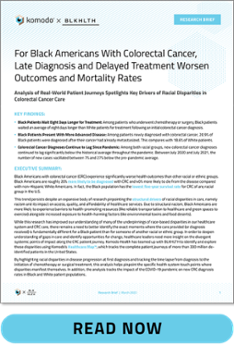Pattern of Late Diagnosis and Delayed Treatment Results in Worse Outcomes for Black Americans with Colorectal Cancer

Analysis of Real-World Patient Journeys Spotlights Key Drivers of Racial Disparities in Colorectal Cancer Care

Recently, Komodo Health has published a number of reports highlighting racial inequities around the treatment and diagnosis of strokes, heart attacks, and chronic conditions. As part of the continued work to identify and close gaps in care in the healthcare system, and timed to Colorectal Cancer Awareness month, Komodo Health and BLKHLTH have teamed up to publish a new analysis on disparities in colorectal cancer (CRC) journeys for Black patients. While CRC is one of the most deadly and frequently diagnosed cancers in the world, Black Americans have the lowest five-year survival rate of any racial group in the U.S.
Although a growing body of research has improved our understanding of racial disparities in our healthcare system, there remains a need to better identify the exact moments when the care provided is fundamentally different for Black patients than for White patients.
In our analysis of 330 million unique patient journeys, we found that among colorectal cancer patients who underwent chemotherapy or surgery, Black patients waited an average of eight days longer than White patients for treatment following an initial colorectal cancer diagnosis.
And, among patients newly diagnosed with colorectal cancer, Black patients presented with more advanced disease. 20.9% of Black patients were diagnosed after their cancer had already metastasized, compared with 18.6% of White patients.
New colorectal cancer diagnoses lagged significantly below the 2019 average throughout the pandemic. This finding held true across racial groups. Between July 2020 and July 2021, the number of new cases vacillated between 7% and 27% below the pre-pandemic average.
Early detection and treatment are vital steps in reducing racial health inequities and improving outcomes for those with CRC. Deepening our understanding of exactly when, where, and how patients experience racial disparities in care will help inform our strategies to build an equitable, high-quality healthcare system.
Read the full research brief  .
.
To see more articles like this, follow Komodo Health on Twitter and LinkedIn, and visit Insights on our website.







